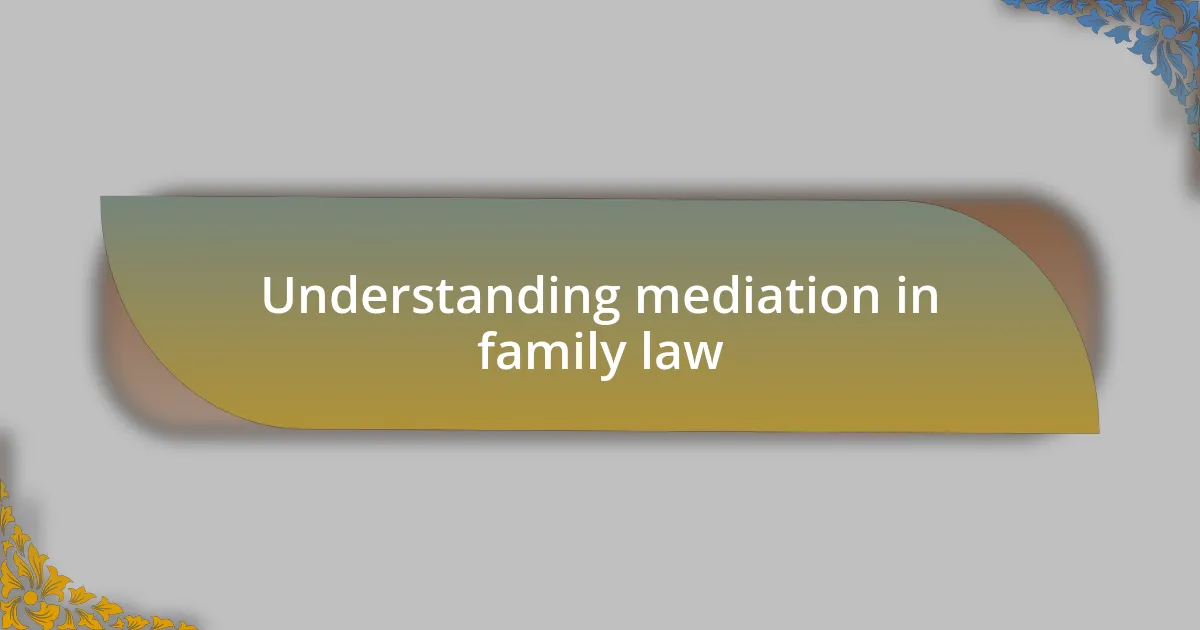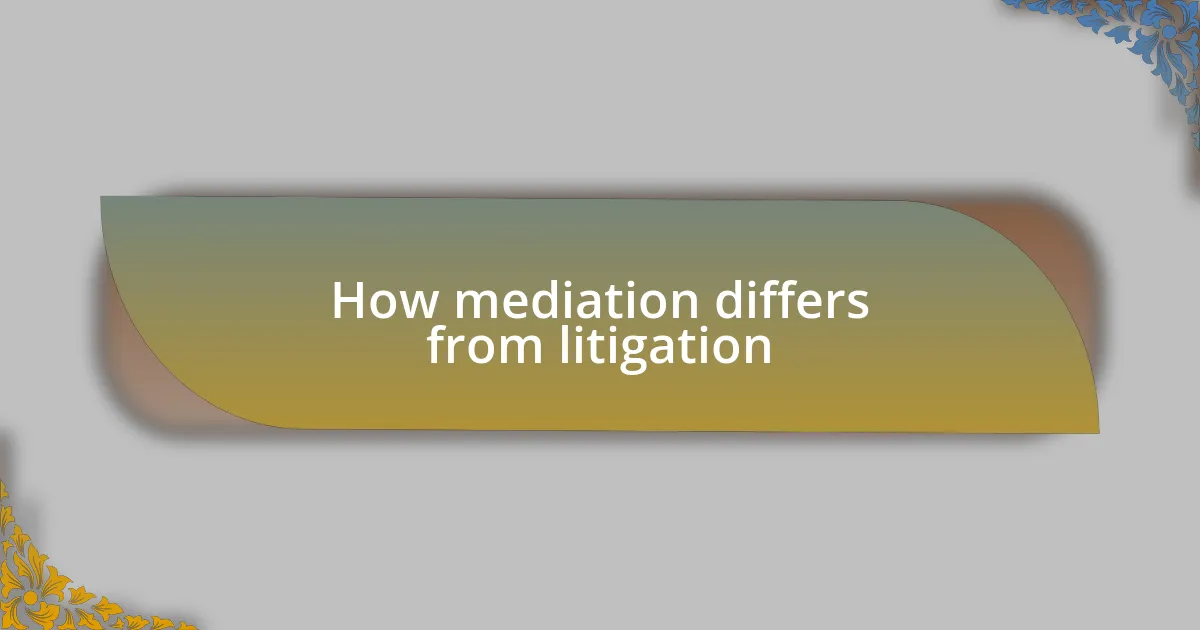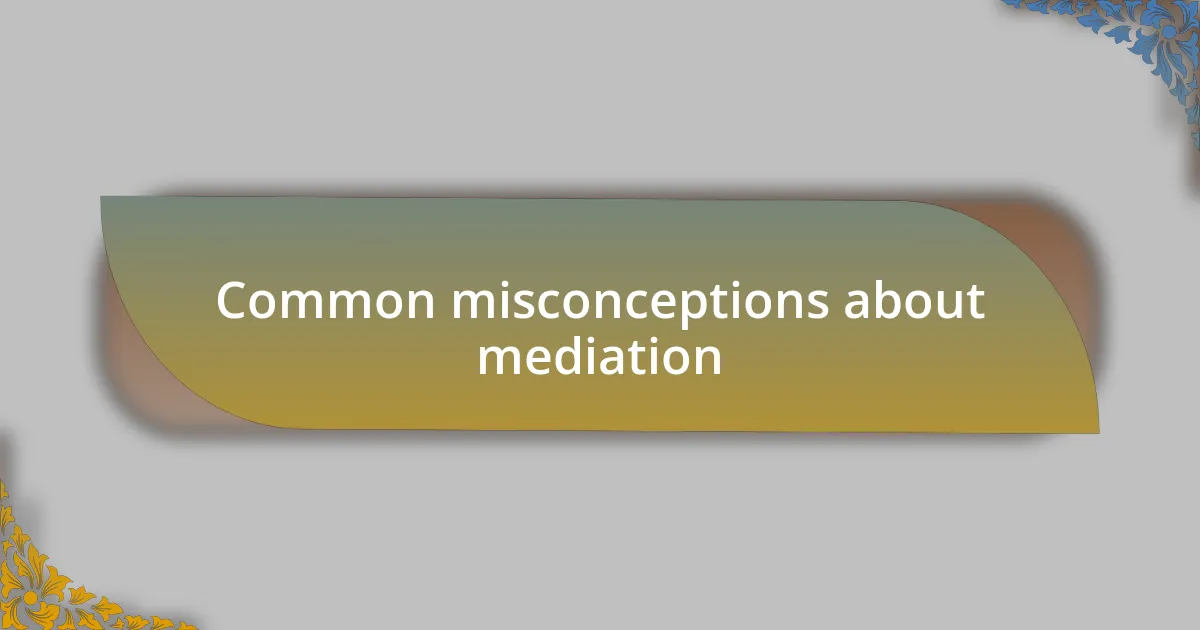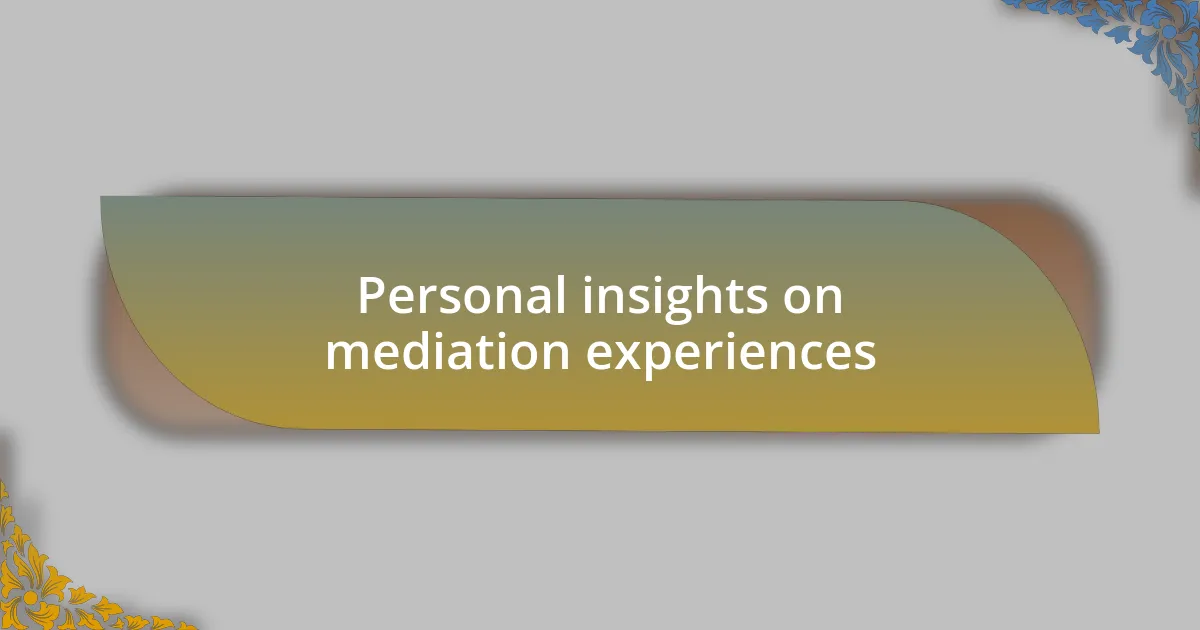Key takeaways:
- Mediation fosters open communication and collaboration, essential for resolving family disputes, especially involving children.
- Unlike litigation, mediation provides a flexible, cooperative environment that allows parties to create tailored solutions, enhancing satisfaction with agreements.
- Mediation can be effective even in contentious situations, transforming adversarial disputes into productive discussions.
- Creating a safe emotional environment and being prepared for underlying issues are crucial for successful mediation outcomes.

Understanding mediation in family law
Mediation in family law serves as an alternative to traditional litigation, allowing parties to resolve disputes outside of court. I remember a case where a couple was able to reconcile their differences regarding child custody simply by sitting down with a neutral mediator. This approach not only saved them time and money, but it also fostered a more collaborative atmosphere, which is crucial when children are involved.
One aspect that often surprises people is how mediation encourages open communication. I once moderated a session where both parties were initially defensive. However, as they shared their feelings, it became clear that their underlying goal was the well-being of their children. Have you ever been in a situation where listening to another person’s perspective changed your viewpoint? That’s the transformative power of mediation.
It’s essential to recognize that mediation is not about winning or losing; it’s about finding common ground. I recall a situation where a couple eventually reached an agreement that felt fair to both, despite their initial disagreements. This experience taught me that the process is as much about healing and understanding as it is about resolution. Isn’t that what we all seek in our most challenging moments?

How mediation differs from litigation
Litigation often involves a more adversarial approach, where parties present their cases in a courtroom setting. I remember sitting in on a family law case that dragged on for months, not only draining the participants emotionally but also exhausting their finances. It made me realize how litigation can escalate conflict rather than resolve it, leaving lasting scars on familial relationships.
In contrast, mediation fosters a cooperative environment aimed at mutual resolution. I once witnessed a couple who entered mediation feeling resentful, yet by the end of the session, they were able to discuss their concerns calmly. This shift in tone underscored how mediation enables individuals to regain control over their outcomes, promoting healthier relationships.
Another key difference is the flexibility mediation offers compared to the rigidity of litigation. I think back to a mediation I facilitated where the couple crafted a unique parenting plan tailored specifically to their children’s needs, something a judge could not have provided. Isn’t it empowering to create your own solutions rather than having them imposed by someone else? In my experience, this autonomy can significantly enhance satisfaction with the final agreement.

Common misconceptions about mediation
One common misconception about mediation is that it’s only for couples who are amicable. Many think that if there’s tension, mediation won’t work. However, I’ve seen firsthand how mediation can transform even the most contentious disputes into productive discussions. Take, for example, a pair I worked with who had been at each other’s throats for years. Through mediation, they found common ground they never thought possible. Isn’t it amazing how a neutral setting can shift perspectives?
Another prevalent myth is that mediation lacks the legal weight of litigation. Some folks worry that an agreement reached in mediation won’t hold up in court. But I can assure you that, when drafted properly, mediation agreements are legally binding. I once helped finalize an agreement that allowed a father to spend more time with his children, which made a profound difference in their lives. It was a reminder that the outcomes of mediation can be just as solid as those made by a judge.
People often believe that mediation is a one-size-fits-all solution. Yet, it’s important to recognize that each situation is unique, and what works for one family may not work for another. I remember assisting a family where traditional mediating techniques just didn’t resonate. By adapting our approach to include creative problem-solving techniques, we found a pathway that suited their specific dynamics. This experience taught me that flexibility in mediation is key to achieving effective resolutions.

Personal insights on mediation experiences
Throughout my mediation experiences, I’ve come to appreciate the emotional weight that each party brings to the table. I vividly recall a session where a client, overwhelmed by grief from a recent loss, struggled to express their needs. It struck me then how vital it is for mediators to create a safe emotional environment. By allowing space for feelings to be expressed, I noticed how this openness led to breakthroughs that allowed the conversation to flow more freely.
Another important insight I’ve gained is the significance of preparation. There was an instance when I was unprepared for the deeply-rooted issues in a couple’s relationship, which made it difficult to navigate their discussion productively. This taught me that understanding the context and history can make all the difference. Isn’t it interesting how sometimes the smallest details can shift the entire course of a mediation session?
I’ve also learned that patience is crucial. I once facilitated a mediation that lasted several sessions because the parties weren’t ready to move forward. At first, I felt frustrated, but then I realized that allowing them the time to process their emotions was necessary for real progress. Patience can often be the unsung hero in finding resolutions. Have you ever noticed how some of the most difficult paths can lead to the most rewarding destinations?